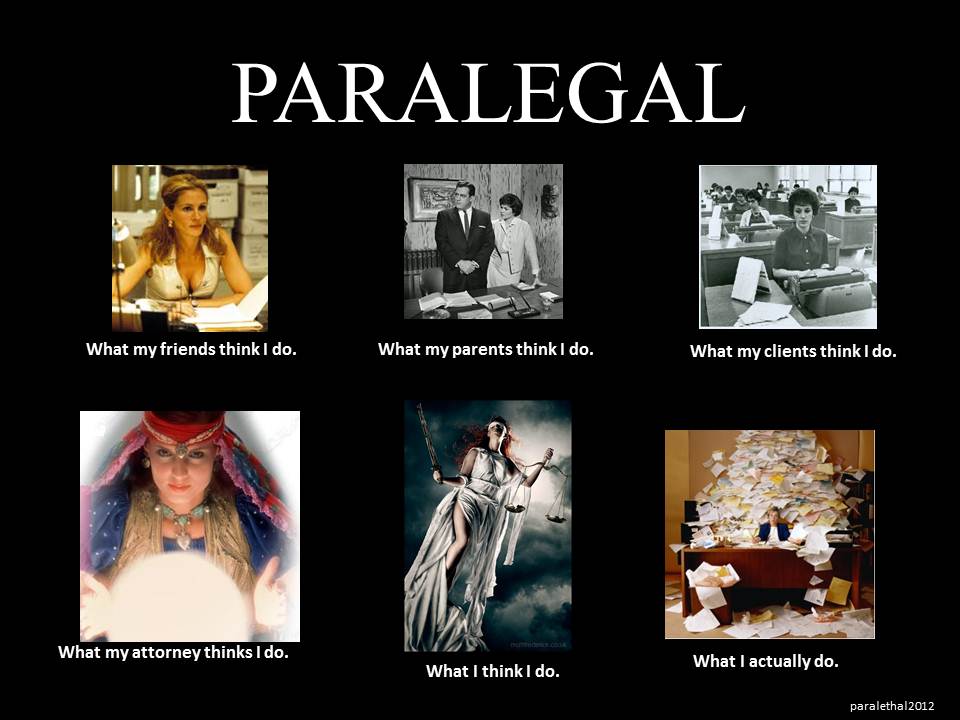There are really two schools of thought when it comes to being a paralegal: what people think it is like and what it really is. While some think all paralegals have an experience similar to that of Erin Brockovich, the fact is that there is only one Erin Brockovich, and the day-to-day work life of most paralegals is not movie worthy.
And who doesn’t love seeing memes like this:

But what is the reality of life as a professional paralegal? Let’s debunk some of the common myths about paralegals.
#1: Paralegals can give legal advice
What paralegal hasn’t been approached by a friend or family member looking for a little legal advice under the guise of “can’t you just tell me what you think?” Unfortunately, if a paralegal tells you what they think regarding a legal question, that’s another way of saying they’re giving legal advice, which is a major ethical breach. By law, only bar-certified attorneys can give legal advice.
#2: Paralegals are just glorified secretaries
Make this statement to a paralegal and prepare to get an earful back. Many people think paralegals are there to perform the menial tasks that attorneys don’t have time for or don’t want to do.
But the fact is that while some duties a paralegal performs can be a bit trivial, a paralegal’s job is usually very challenging. In fact, according to the ABAModel Guidelines for the Utilization of Paralegal Services, a paralegal’s work consists of “specifically delegated substantive legal work for which a lawyer is responsible.”
Working with paralegals allows attorneys to prioritize responsibilities that would otherwise rest on their shoulders alone.
#3: Paralegals work nine to five
While some paralegals aren’t required to work any overtime, many spend at least occasional nights and weekends in the office to prepare for trial, help a client, meet a deadline, or bail out a supervising attorney who procrastinated (again).
#4: You don’t need a degree to be a paralegal
While it’s true that you don’t need a four-year Bachelor’s degree to become a paralegal (on-the-job training will technically suffice), the legal industry tends to prefer college-educated paralegals that have earned at least an Associate’s degree. So why get a bachelor’s degree in paralegal studies? The extra education could help you break into a larger, more prestigious firm, earn more money, and advance faster.
#5 Paralegals make a lot of money
It’s true that paralegals typically earn more than minimum wage, but that doesn’t mean they’re rolling in the dough. According to Salary.com, the average paralegal in the U.S. earns between $48,177 and $61,516, a fair number depending on the location, but definitely not qualifying them as rich. A small percentage of paralegals may earn higher than most, but usually not until after they have put in years of hard work.
#6: Paralegals spend a lot of time in court
Although it depends on the area of law in which a paralegal works, most don’t get much, if any, court time. Instead, they spend the majority of their days toiling behind the scenes in their office (if they’re lucky enough to have their own office) preparing documents on the computer, speaking with clients on the phone, and making copies – whatever it takes to help the firm operate more efficiently.
#7: Paralegals know all about all areas of law
A paralegal who worked for a bankruptcy attorney for many years should basically be an expert in divorce law, right? Wrong. Just as attorneys can and often do specialize in a certain area of law, paralegals also have their own areas of expertise, often dictated by what their supervising attorney chooses to focus on.
#8: Being a paralegal isn’t that stressful
The legal industry is extremely busy, deadline-driven, and high-pressure. The lawyer is ultimately responsible for the work done by a paralegal and that work tends to be urgent and of great importance. The fact that it must be done under the direction of an impatient, demanding attorney makes a paralegal’s job often very stressful.
#9: They can’t lawyer, so they…. paralegal.
A paralegal career is a choice, not something settled for by a person who couldn’t make it in law school, as some might think. Although they perform many of the same duties as lawyers, paralegals don’t have the responsibility of representing clients, don’t have to pay malpractice insurance, make a pretty decent living, and generally enjoy a better work-life balance than most attorneys do, making their career choice a pretty sound one after all.
***
Do you know of other myths about being a paralegal that you’d like to dispel?









